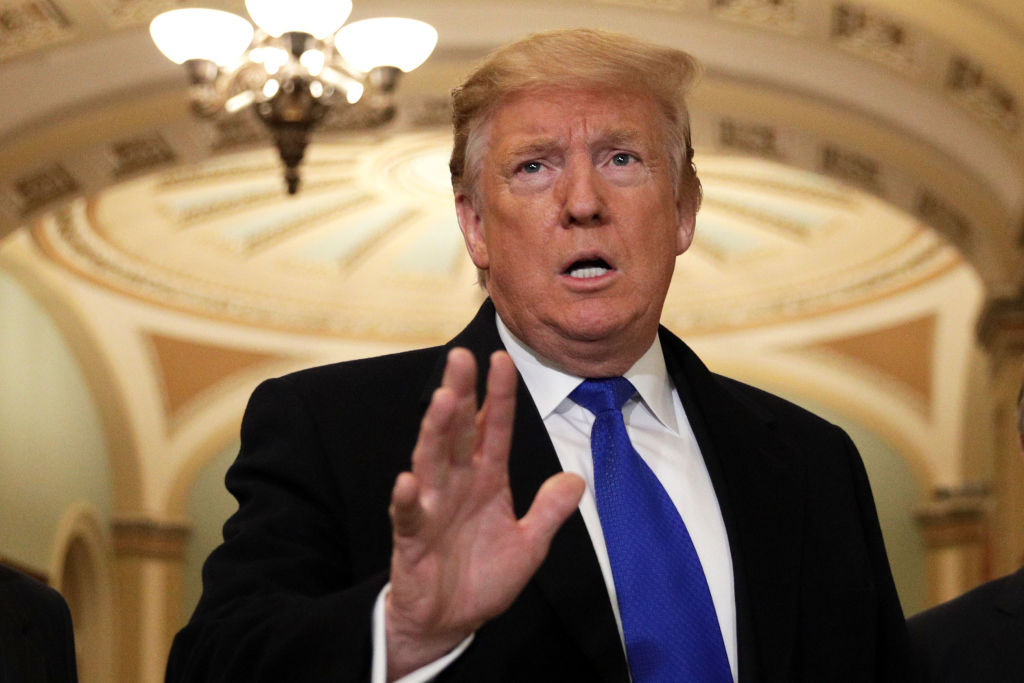President Trump seems to be enjoying his presidency, for a change. His Twitter feed betrays none of the nervousness of the tense weekend when Mueller submitted his findings to the attorney general, William Barr. Then, for an extraordinary and probably unprecedented 24 hours, Trump’s Twitter fell almost silent. Now he writes, joyously: ‘No Collusion – No Obstruction!’ Perhaps this is not just spin and Trump really believes he has been proven innocent and can cruise towards the Republican nomination in 2020 and on to a second term.
Or can he? Mueller simply set out ‘facts’ on both sides of the question of whether the President had obstructed justice – when he fired James Comey as director of the FBI, to deal with the ‘Russia thing’, and when he tweeted to attack Mueller’s prosecutors as ’13 angry Democrats’. (They’re now ‘18 angry Democrats’ in the latest tweets.)
Barr has decided the column of facts labelled ‘Prosecute’ is shorter, or less weighty, than the column labelled ‘Do not prosecute’ – but Congress may think differently. When Barr was appointed, a former federal prosecutor told me he would be ‘the people’s lawyer, not Trump’s lawyer’. It’s fair to say, however, that Barr has so far set the agenda in a way that suits the President.
Mueller did not ‘establish’ there had been collusion between Team Trump and Russia according to the very high standard of proof beyond a reasonable doubt in a criminal case. But just four incomplete sentences – fewer than 90 words – of Mueller’s made it into Barr’s letter to Congress. There are some 400 pages of the report altogether. What else is in there? When a FISA warrant was issued for surveillance of a Trump campaign advisor, Carter Page, the court was reportedly told: ‘The FBI believes that the Russian Government’s efforts are being coordinated with Candidate #1’s campaign…’ Candidate #1 was of course Donald Trump. Presumably, Mueller’s full report explained the basis for the FBI’s belief. Now we must wait to see how much of that explanation remains unredacted.
The words in the Carter Page warrant – if accurate – were cited by Andrew Crawford, a former prosecutor who supports the President. Trump was telling everyone yesterday to read Crawford’s column in the New York Post, about how the Obama administration ‘spied’ on his campaign. Whether there was ‘spying’ or legitimate surveillance depends on why the FBI was doing what it was doing – the ‘predicate’ of the investigation as Barr said in his letter to Congress. Crawford and Trump say the FBI were just trying to find dirt and the ‘predicate’ was a dodgy dossier by a former British spy – Christopher Steele – paid for by the Democrats. Trump tweeted yesterday: ‘Wow! FBI made 11 payments to Fake Dossier’s discredited author, Trump hater Christopher Steele. The Witch Hunt has been a total fraud on your President and the American people! It was brought to you by Dirty Cops, Crooked Hillary and the DNC.’
Steele was indeed paid ’11 times’ by the FBI, not for the ‘dossier’ on Trump but for earlier work. His friends say that history with the FBI is evidence of his credibility – that he’s an intelligence professional, not a political hack and a Trump hater. He did have two meetings with the FBI in the summer of 2016 to brief them on his findings – but he doesn’t know if any of that material found its way into FISA applications, let alone whether it swayed the court. It’s unlikely that the FBI did rely on much of anything from Steele for their FISA applications. He sent the dossier to John McCain after the election precisely because he thought the FBI was ignoring it. It is possible, however, that the FBI is continuing to pursue some lines of inquiry suggested by the dossier, though Mueller himself has stepped down. One thing to watch out for in the report later today is whether it states that all aspects of the FBI’s counterintelligence investigation have been wound up, or not.
The report will be on the Special Counsel’s website. The FBI tends to redact heavily and cautiously. That’s why Mueller’s team prepared their own unclassified summaries, which for some reason did not make it into Barr’s letters to Congress. Whether he allows those summaries into what is made public today will be seen as a test of his good faith. At the very least, the President’s enemies will be looking to the report to explain why the Russia inquiry seemed to be leading in one direction, ever closer to Trump, but then stopped. Was the President actually exonerated – ‘completely and totally, as the White House talking points say – or was it just that Mueller couldn’t make a case that would stick in court?
One witness to the Senate intelligence committee told me he was still puzzling over why Michael Flynn and Rick Gates got such light sentences if not to flip on someone above them. Cracking the ‘conspiracy’ would need Manafort and Cohen to talk about Russia and neither had. Perhaps, he said, their families had been threatened – it was the only way to understand Manafort’s flipping and flopping on whether he would cooperate with Mueller. It’s a theory I’ve heard many times from the anti-Trumpers, the Russian mafia making an offer that Manafort could not refuse. To Trump’s supporters, this is evidence of a cult-like mentality among the believers in ‘Russiagate’.
Four hundred pages is a long report. No doubt Trump will find things in it he likes. But his tweets so far have been a hostage to fortune – especially if there is anything less than the full exoneration he claims when we do finally read Mueller’s conclusions in his own words.
Paul Wood is a BBC correspondent.






Comments